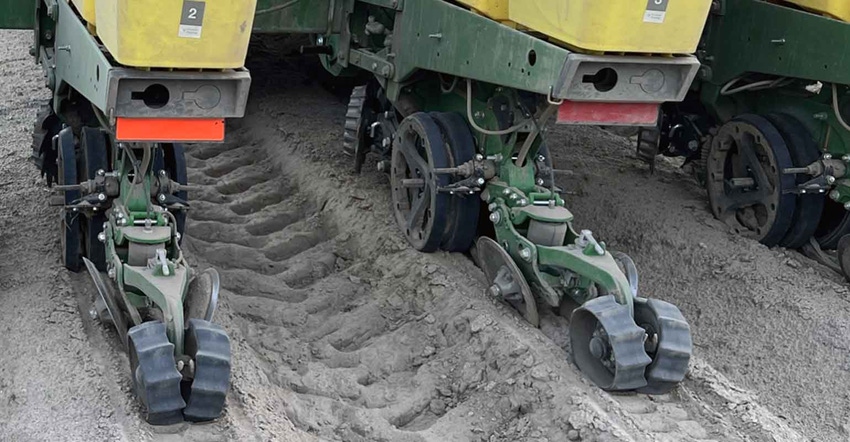May 18, 2022

Application of in-furrow granular pesticides is a common practice at planting for pest, disease and nematode management in key row-crops including corn, peanuts and cotton grown in the southeastern US.
In-furrow pesticides are important tools for growers to stay on top of pests, diseases and nematodes early in the season as the opportunity for their successful management, in most cases, closes with the furrow at planting.
Similar to the seed metering and placement issues during planting, application issues with in-furrow pesticides are also quite common and the penalty associated with lack of proper application is even more severe than a poor or uneven stand establishment. It is not uncommon to hear about or to see the fields where the proper rate of an in-furrow product was not applied due to stopped up delivery tubes or product metering issues, and the struggling crop in certain rows or parts of the field because of those application issues.
Given the frequency of such occurrences every year, one of the common questions from Extension agents and growers has been about the availability of any application technology for metering or monitoring in-furrow granular pesticides during application. The good news is that, in fact, there are two technology options available in the market for precision application of granular inputs during planting.
SmartBox
SmartBox (the newest version is available as SmartBox+) is an application system from AMVAC Chemical Corporation which utilizes an electronically controlled auger to accurately meter the product on each row. The SmartBox system is comprised of two components – a base container and a transfer container, also referred to as cartridge, for each row-unit on the planter.
The base containers are mounted on the planter row units whereas the transfer containers contain the granular pesticide (50 pounds) and are attached to the base containers prior to the application. The system also utilizes a rate controller to adjust the product flow with changes in planting speed and an in-cab display to monitor application rate for each row-unit during application.
The in-cab display/monitor is also programmed to make an operator aware about the stopped-up tubes, non-functional meter or an empty chemical box by row. The SmartBox system can also be used with other compatible ISO displays including Trimble GFX, AgLeader InCommand 1200, John Deere GS3 and Raven Viper 4/4+.
SmartBox system is a fully closed transfer system, which means there is no exposure to granular pesticides at all during the preparation or application process. Currently, the transfer boxes for the SmartBox system are available for commonly used in-furrow granular pesticides in corn, cotton and peanut including Thimet and Counter.
vDrive is an electric drive system available through Precision Planting for both seeding and granular pesticide applications on a planter. Unlike the SmartBox, the vDrive system only replaces the mechanical drive on the pesticide box with an electric drive and a paddle wheel system to accurately meter the product on each row unit.
vDrive
The vDrive system is configured and controlled through manufacturer’s standard planter display (20|20 SeedSense) and also has the capabilities to regulate the product flow with changes in ground speed to maintain a target application rate.
The vDrive system can be used with any granular pesticide product as commonly used in mechanically driven pesticide boxes on the planters. Similar to the SmartBox system, the vDrive system also monitors the product on each row-unit individually and alert the user on stopped up meter or an empty chemical box.
Both SmartBox and vDrive systems can be retrofitted to any make and model of row-crop planters including John Deere, Case IH, and Monosem. In addition to standard rate control features, both systems also provide swath control (individual rows or rows grouped together can turn ON and OFF to prevent skips and overlap) and variable-rate capabilities as well as record spatial application data – as-applied maps – which can be used to assess where and how much product was applied in different areas within a field.
While these pesticide application technologies provide better control and monitoring over mechanically driven systems, the proper setup and calibration of these systems are still important and must be performed to ensure precision application of in-furrow pesticides at planting.
Source: University of Georgia Extension, which is solely responsible for the information provided and is wholly owned by the source. Informa Business Media and all its subsidiaries are not responsible for any of the content contained in this information asset.
You May Also Like




